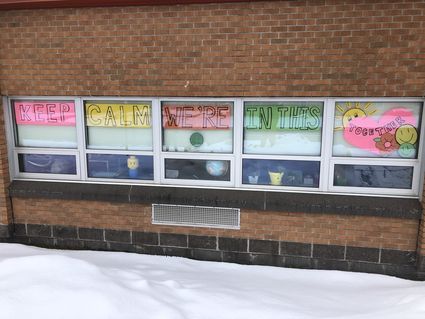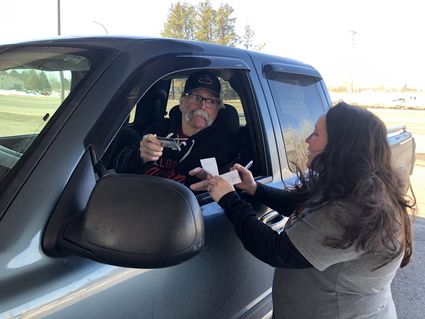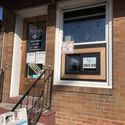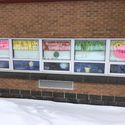Governor issues 'stay at home' order, extends business closures
March 27, 2020

Jana Peterson
Second-grade teacher Jolene Aho shared this heartfelt message across the exterior windows of her classroom at Washington Elementary School in Cloquet. "It's a little encouragement for the community and kids we love," said Washington principal Robbi Mondati. On Friday, Gov. Tim Walz announced that schools will implement distance learning through May 4.
Get used to it, Carlton County. Things may have been pretty quiet the last two weeks since Minnesota Governor Tim Walz declared a peacetime emergency in response to the COVID-19 pandemic, but they're only going to get more quiet between now and April 10.
On Wednesday, the governor issued a "stay at home" order effective at 11:59 p.m. Friday, March 27 through April 10, for people living in the state. All Minnesota residents are ordered to stay at home except for trips out for food, groceries and other necessary supplies, health and safety activities, outdoor activities, essential intrastate and interstate travel and care of others.
If a business is not included on the state's extensive list of critical businesses, then it should be closed and its employees should not go to work. (See mn.gov/deed/newscenter/covid and click on "Critical Business Information.)
Also Wednesday, Walz extended his executive order 20-04 - which closed restaurants, bars, gyms, salons and a whole host of other businesses to sit-down customers March 17-27 - through May 1. For restaurants, that means take out, curbside, drive-thru or delivery services can continue. For other businesses on the list, closed means closed. (See "Businesses under mandatory closure to public occupancy" at the end of this story for the complete list of business types affected by executive orders 20-04 and 20-18.)
Walz said during his announcement Wednesday that he gave the orders to give hospitals and statewide agencies time to prepare for what he said is an inevitable level of infection. It will give businesses and healthcare time to increase the number of ventilators and personal protective equipment (PPE) such as masks and gloves so hospitals and cities are ready to treat the large number of people who will need intensive care.
"With no mitigation, 6,000 people would need ICU (intensive care unit) by end of April and the state has only 235 beds now," Walz said, adding that 2.4 million people would be infected without mitigation, but approximately 85 percent would recover without hospitalization.
By doing what the state has already done, and by ordering people to stay at home until April 10, Walz said it will buy the state enough time to make arenas, hotels and other venues into hospitals and get more ventilators into place, to raise the capacity for ICU.
"Minnesota wants to ensure if you need ICU, it's there," he added. "If you need PPE, it's there. If you need testing, it's there."
A changed world
A drive around Cloquet Monday afternoon revealed a city only half awake, even before the new "shelter in place" order.
There was some business going on, after all, but not a lot. There were quite a few people out walking though.
Hair and nail salons were closed. Buskala's Jewelry & Gifts was open by appointment only. TJ's Pawn shop was open, and the one employee inside was so eager for business he came outside when a person turned away. "Tell people we have DVDs if they're bored," he said.
The funeral homes are open, but even they have had to adapt, as the state has limited gatherings to 10 people or fewer.
Premiere movie theater is closed. County Seat Theater has postponed its latest show. Most bank lobbies are closed, although ATM machines and drive-throughs remain open for customers.
Some restaurants, such as Culbert's Cafe and Trapper Pete's, are also closed. They're in a minority, for now. Others are offering takeout and/or delivery, and those with drive-through windows are celebrating their own good fortune.
Gordy's Hi-Hat owner Dan Lundquist said Wednesday morning that he does not yet have a date to open, but he has been working with the Minnesota Department of Health and state and national restaurant associations to come up with a plan that's safe for everyone. He was also waiting to hear what the governor had to say about the closure order.
"We're ready, we just want to make sure we'll be extremely safe," Lundquist said. "When we come up with that plan, we'll go."
In the meantime, business at the Warming House is good, via both the drive-thru and carry out. It's not as busy as normal, but he's not complaining, Lundquist said.
"We're keeping employees busy on a smaller, tighter schedule," he said.
Park Avenue Fitness and Anytime Fitness both had to close, but the liquor stores are still open. Sometimes they get kind of crowded, one employee said.
It's strange to see all the empty parking lots at businesses around town. Family Tradition is bringing carry-out orders to customers under the carport, so the front lot was empty Friday.
The Streetcar in Carlton has a spot along the side where they will bring out food to customers, and Magnolia Café down the road put in a new walk-up window to serve customers for now.
Black Bear Casino Resort is closed, all of it. The vast parking lot was empty Saturday, save for two security guards sitting in black pickup trucks, stopping anyone who wanted to cruise through the empty parking lot.
Critical businesses remain open
The list of critical businesses is extensive and will leave open a large number of the businesses that haven't already been shut down.
Health care and supporting industries. Law enforcement and public safety. Energy. Water and wastewater. Transportation and logistics. Public works. Government. The judicial, legislative and executive branches of government. The National Guard. Faith leaders. Educators. Construction and other trades. Hotels and residential facilities and shelters. Charitable and social service organizations. Newspapers, radio stations and TV stations are included. Financial services. Tribal governments. Critical manufacturing - including forest industries.
Cloquet Sappi managing director Tom Radovich said the mill and its suppliers, loggers and more are all considered essential critical businesses, according to the Department of Homeland Security.
"We feel we are essential," Radovich said. "We make packaging products for labels, like the ones that go on cans of food. Our dissolving pulp is used to make a product called lyocell, which is a naturally hypoallergenic substance used in hospital gowns, bedding, sterile dressings, etc. We don't make it, we supply the primary raw material that's used to produce it," he said.
So while jobs are safe at Sappi, Radovich said they have been busy adapting to a world where people are supposed to keep a healthy distance between them, doing everything from changing the way deliveries are made so there is no face-to-face contact, to creating teams of salaried employees who alternate working from home and working at the mill to lessen the spread of infection, to figuring out how to maintain a safe social distance in control rooms.
They have people on quarantine at home, following trips and other possible sources of contamination. The company is offering financial benefits for those two weeks, covering their pay for that time.
"You've got to do the right thing," he said.
People are still anxious, he said. The rate of change has been so rapid. So the local mill sends out a daily update to employees, and he has been talking with other mill managers about the status of each site and what's happening there. They are sharing information and trying to anticipate what could happen.
"Like everyone else, we're watching to see what's happening, almost like a bad movie," he said. "Most companies have plans for emergencies, but this is something different. You couldn't predict this in terms of how it's rolling out."
Businesses under mandatory closure to public occupancy
The list of businesses closed "to ingress, egress, use and occupancy" by Minnesota Governor Tim Walz grew far beyond the originally mentioned restaurants, bars and gyms. And, while the closure was originally set for only March 17-27, Walz extended his order Wednesday afternoon to be effective through May 1.

Jana Peterson
It's the new way to get something to eat away from home: curbside service. Tom Montgomery pays Nikki Crotteau for a lunch order at Family Tradition Restaurant Friday. Montgomery owns Lost Tavern. He said they were working inside to do extra cleaning and other projects during the governor's mandated closure.
Here's the entire list of businesses affected by the governor's executive order:
-Restaurants, food courts, cafés, coffeehouses and other places offering food or beverage for on-premises consumption; (although takeout, delivery, drive-thru and curbside are allowed).
-Bars, taverns, brew pubs, breweries, microbreweries, distilleries, wineries, tasting rooms, clubs and other places offering alcoholic beverages for on-premises consumption;
-Hookah bars, cigar bars and vaping lounges offering products for on-premises consumption;
-Theaters, cinemas, indoor- and outdoor performance venues, and museums;
-Gymnasiums, fitness centers, rec centers, indoor sports facilities, indoor exercise facilities, exercise studios and spas;
-Amusement parks, arcades, bingo halls, bowling alleys, indoor climbing facilities, skating rinks, trampoline parks, and other rec and entertainment facilities;
-Country clubs, golf clubs, boating or yacht clubs, sports or athletic clubs and dining clubs.













